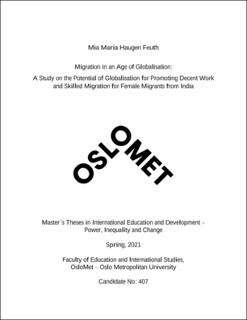Migration in an Age of Globalisation: A Study on the Potential of Globalisation for Promoting Decent Work and Skilled Migration for Female Migrants from India
Master thesis
Published version
Permanent lenke
https://hdl.handle.net/11250/2976724Utgivelsesdato
2021Metadata
Vis full innførselSamlinger
Sammendrag
The aim of this theses is to inquire into how India’s process of globalisation, most notably the implementation of market-oriented reform policies and privatisation of the labour market in 1991, guided by neoliberalism, has increased the number of highly skilled and educated female labour migrants leaving India for the Global North. I argue that, with growing technological advancement led by India’s integration into the global market, the acquisition of decent and recognised work for a certain group of Indian women has been improved. I highlight how the potential to become highly skilled and formally employed is dependent on the basis of caste, class, and gender, and how India’s inveterately stratified nature dictates the basis for what is seen as acceptable female activity and unacceptable female activity, as related to the labour market. Although decent work might be a privilege reserved for a small category of Indian women, the potential for increased empowerment and autonomy through formally recognised work and later, migratory experiences from the Global North, has manifested itself as a powerful tool in increasing the power of migrant women. Additionally, the increasing stream of skilled female migrants coming from India is confronting India’s patriarchal nature, with attitudes, desires, knowledge, and aspirations gained from work experience abroad confronting the subjugated position many Indian women face.
